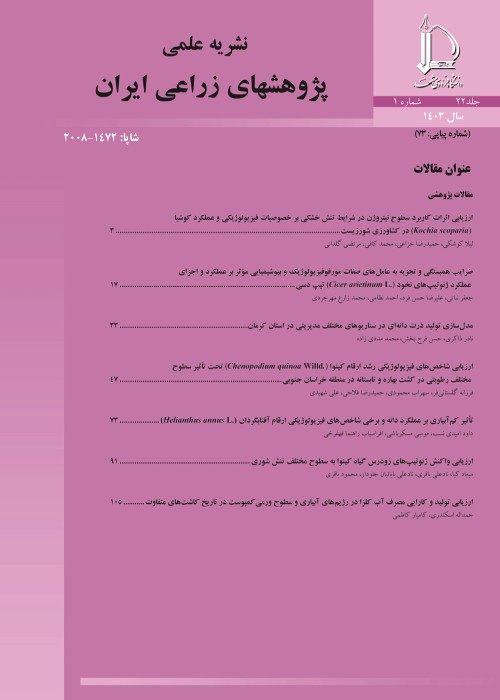The Effect of Different Organic and Chemical Fertilizers and their Combined Application on the Quantity and Quality Characteristics and Yield of Tomato
Long-term use of chemical fertilizers can cause many adverse effects. In addition, excessive consumption of chemical fertilizers can lead to decreased food safety and low quality of vegetables, such as the accumulation of nitrates in plants. Today, using organic fertilizers is an efficient way to achieve sustainable agricultural development. The release rate of nutrients from organic fertilizers is slow and hardly exceeds the absorption capacity of plants compared to chemical fertilizers.
To compare the effect of chemical and organic fertilizers on the quantitative and qualitative traits of tomatoes in field conditions, an experiment was conducted in the cropping year of 2020-2021 in a randomized complete blocks design with three replications in the research farm of the Faculty of Agriculture, Ferdowsi University of Mashhad, Iran. Experimental treatments included: 1- biochar (8 t.ha-1), 2- animal manure (30 t.ha-1), 3- vermicompost (25 t.ha-1), 4- NPK chemical fertilizer (225 kg.ha-1 urea, 150 kg.ha-1 phosphorus fertilizer and 150 kg.ha-1 potassium sulfate), 5- 50% biochar + 50% animal manure, 6- 50% biochar + vermicompost, 7-50% animal manure + 50% vermicompost, 8- 50% biochar + 50% NPK, 9- 50% animal manure + 50% NPK, 10- 50% animal manure + 50% NPK, 11- 25% biochar + 25% animal manure + 25% vermicompost + 25% NPK and 12- control. The harvesting operation was carried out in two cutting. Five plants were randomly selected in each plot, and traits such as fruit size, length, and diameter were measured. Also, total yield, Brix index, vitamin C, and lycopene were measured in both cuttings.
In the first and second cutting, the highest fruit volume was obtained in the treatment of NPK chemical fertilizer (80.5 cm-3) and the combined use of NPK chemical + animal manure (131 cm-3), respectively. In the first cutting, the maximum fruit length was reported in the treatment of NPK chemical fertilizer (5.61 cm), and the second cutting, in the combined application of NPK chemical fertilizer + animal manure (7.16 cm) that compared to the control (4.73 cm) had a longer fruit length of 51%. The largest fruit diameter was observed in the NPK chemical fertilizer treatment (5.01 cm), which was 16% more than the control (4.31 cm). On the other hand, in the second cutting, the largest fruit diameter was shown in the combined application of chemical NPK + manure (5.54 cm). In the first cutting and the total of both cuttings, the highest yield was observed in the treatment of NPK chemical fertilizer (39.6 and 70.5 t.ha-1, respectively), while in the second cutting, the highest yield was obtained in the combined treatment of NPK chemical fertilizer + animal manure. (32.8 ton.ha-1). The results showed that using organic fertilizers individually and combinatorial compared to NPK chemical fertilizers had more Brix index, vitamin C, and lycopene. The highest amount of Brix index in first and second cutting (6.55 and 7.13, respectively), vitamin C (12.9 and 11.4 mg.100 g sample-1, respectively), and lycopene (2.48 and 2.25 mg.100 g sample-1, respectively) in the combined treatment of animal manure + vermicompost. Since the elements in the chemical fertilizer are released faster than the elements of other fertilizers and are available to the plant, therefore, by increasing the initial growth of the plant and as a result of improving its flowering potential, the total yield increased, in particular in the first cutting, where the superior treatment was the NPK chemical fertilizer. Further, due to the gradual release of organic fertilizer elements, the combined treatment of chemical and organic fertilizers increased the yield. On the other hand, organic matter plays an important role in soil fertility and performance. The rare elements in organic matter can meet the needs of soil microorganisms, enhance microbial activities, affect soil-microorganism interactions, and indirectly affect crop quality.
The use of organic fertilizer, when combined with chemical fertilizer, can enhance both the qualitative and quantitative characteristics of tomatoes. By substituting a portion of chemical fertilizer with organic fertilizer, not only can yield be improved, but it's also possible to reduce the consumption of costly chemical fertilizers. This approach aligns with sustainable agricultural goals by optimizing the use of organic fertilizers.
Biochar , Brix index , Tomatoes , Vermicompost , vitamin C
- حق عضویت دریافتی صرف حمایت از نشریات عضو و نگهداری، تکمیل و توسعه مگیران میشود.
- پرداخت حق اشتراک و دانلود مقالات اجازه بازنشر آن در سایر رسانههای چاپی و دیجیتال را به کاربر نمیدهد.


